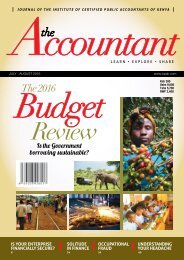The Accountant Sep-Oct 2016√(2)
Create successful ePaper yourself
Turn your PDF publications into a flip-book with our unique Google optimized e-Paper software.
GOVERNANCE<br />
PUBLIC FINANCE<br />
MANAGEMENT PERSPECTIVES<br />
By John Ndunyu, johnndunyu@kpmg.co.ke<br />
PFM capacity building and<br />
professionalisation<br />
This article is derived from a presentation I<br />
recently gave at the 23rd annual conference<br />
for <strong>Accountant</strong> Generals from Eastern<br />
and Southern Africa, ESAAG. I thought<br />
I should share these thoughts with a wider<br />
audience. <strong>The</strong> whole issue about Public<br />
Finance Management (PFM) is one of<br />
stewardship. A few of us are mandated by<br />
the wider population to manage our<br />
collective resources for our common good.<br />
Think about your household. At the family<br />
level, finances must be properly managed,<br />
planned for, mobilised, effectively and<br />
efficiently spent if the family is to thrive.<br />
If the people responsible for doing this,<br />
usually the parents, do not undertake this<br />
responsibility diligently, the family will<br />
often experience cash problems; children<br />
will perhaps not continue their education<br />
for financial reasons or there will be<br />
challenges in accessing quality medical<br />
care, among many other challenges one<br />
can think of.<br />
It is the same with nations. Stewardship<br />
requires that those we have chosen to<br />
manage our collective resources on our<br />
behalf do so efficiently and effectively<br />
to improve our welfare; improvement<br />
of this welfare happens at an individual<br />
level as well as for entire communities. It<br />
includes access to quality healthcare,<br />
education, security, housing, clean<br />
environment, good infrastructure such<br />
as roads, communication etc. If resources<br />
are prudently managed in a manner that<br />
adds value to our economic activities,<br />
we experience growth in GDP and in<br />
revenues which avails more resources for<br />
provision of services to mwananchi. This<br />
in turn leads to satisfaction amongst the<br />
populace who become more supportive<br />
of government policies and efforts. It is a<br />
continuous cycle.<br />
This is the objective of PFM; to<br />
benefit citizens of a country. Good<br />
public finance practices become enablers<br />
for government policy implementation,<br />
efficient and effective resource allocation<br />
and use, fiscal discipline and transparency<br />
and accountability.<br />
In this article, I will confine myself<br />
to capacity building of those we have<br />
entrusted with the responsibility to<br />
manage our collective resources.<br />
What is capacity building?<br />
A number of organisations, including<br />
CIDA (Canada), <strong>The</strong> European<br />
Commission (EC), UNDP and GTZ<br />
(Germany) have definitions of capacity<br />
building in relation to public finance<br />
36 SEPTEMBER - OCTOBER 2016



